
Band of Gypsys is a live album by Jimi Hendrix and the first without his original group, the Jimi Hendrix Experience. It was recorded on January 1, 1970, at the Fillmore East in New York City with Billy Cox on bass and Buddy Miles on drums, frequently referred to as the Band of Gypsys. The album mixes funk and rhythm and blues elements with hard rock and jamming, an approach which later became the basis of funk rock. It contains previously unreleased songs and was the last full-length Hendrix album released before his death six months later.

First Rays of the New Rising Sun is a compilation album credited to American rock musician Jimi Hendrix, issued in April 1997 on MCA Records. Featuring songs mostly intended for his planned fourth studio album, it was one of the first releases overseen by Experience Hendrix, the family company that took over management of his recording legacy. It reached the album charts in the United States, United Kingdom, and four other countries.

George Allen "Buddy" Miles Jr. was an American composer, drummer, guitarist, vocalist and producer. He was a founding member of the Electric Flag (1967), a member of Jimi Hendrix's Band of Gypsys (1969–1970), founder and leader of the Buddy Miles Express and later, the Buddy Miles Band. Miles also played and recorded with Carlos Santana and others. He also sang lead vocals on the California Raisins claymation TV commercials and recorded two California Raisins R&B albums.

Experience Hendrix: The Best of Jimi Hendrix is a compilation album of songs by American rock musician Jimi Hendrix, released in 1997 by MCA and reissued in 2010 by Legacy Recordings. The single compact disc collects 20 songs spanning his career, from his first recordings with the Jimi Hendrix Experience in 1966 to his last with Billy Cox and Mitch Mitchell in 1970.

Blues is a compilation album of blues songs recorded by American singer/songwriter/musician Jimi Hendrix. Compiled by interim Hendrix producer Alan Douglas, it was released April 26, 1994, by MCA Records. The album contains eleven songs recorded by Hendrix between 1966 and 1970, six of which were previously unreleased. Hendrix wrote seven of the pieces; other writers include Muddy Waters, Booker T. Jones, and Elmore James. Most are demos, jams, and live recordings, which Hendrix may or may not have completed for release.
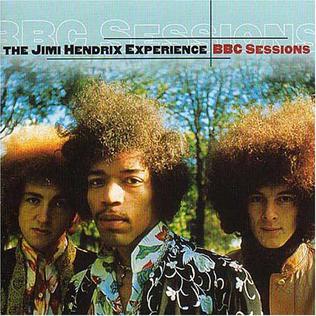
BBC Sessions is an album of recordings by the rock group the Jimi Hendrix Experience, released on MCA Records on June 2, 1998. It contains all the surviving tracks from their various appearances on BBC radio programmes, such as Saturday Club and Top Gear, recorded in 1967.

Live at Woodstock is a posthumous live album by Jimi Hendrix released on July 6, 1999. It documents most of his performance at the Woodstock Festival on August 18, 1969, and contains Hendrix's iconic interpretation of "The Star-Spangled Banner" and other songs from the original festival film and soundtrack album.
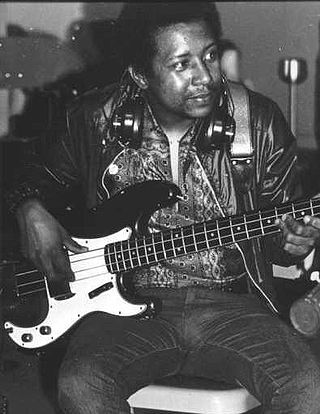
William "Billy" Cox is an American bassist, best known for performing with Jimi Hendrix. Cox is the only surviving musician to have regularly played with Hendrix: first with the experimental group that backed Hendrix at Woodstock, followed by the trio with drummer Buddy Miles that recorded the live Band of Gypsys album, and, lastly, The Cry of Love Tour trio with Mitch Mitchell back on drums. Cox continues to perform dates with the Band of Gypsys Experience and the Experience Hendrix Tour.

"Machine Gun" is a song written by American musician Jimi Hendrix, and originally recorded for the 1970 Band of Gypsys album, with Billy Cox and Buddy Miles. It is a lengthy, loosely defined (jam-based) protest of the Vietnam War.
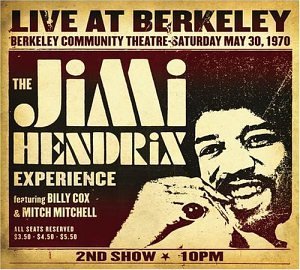
Live at Berkeley is a live album by American rock musician Jimi Hendrix. It documents his second performance at the Berkeley Community Theatre on May 30, 1970, and was released by MCA Records on September 16, 2003.

"Freedom" is a rock song by Jimi Hendrix that is often regarded as one of the most fully realized pieces he wrote and recorded in the months before his death. It incorporates several musical styles and the lyrics reflect various situations facing Hendrix at the time.

Rainbow Bridge is a compilation album by American rock musician Jimi Hendrix. It was the second posthumous album release by his official record company and is mostly composed of recordings Hendrix made in 1969 and 1970 after the breakup of the Jimi Hendrix Experience. Despite the cover photo and subtitle Original Motion Picture Sound Track, it does not contain any songs recorded during his concert appearance for the 1971 film Rainbow Bridge.
"Stepping Stone" is a song by American musician Jimi Hendrix. Written and produced by Hendrix, he recorded it early in 1970 with the short-lived Band of Gypsys lineup of Hendrix, Billy Cox and Buddy Miles. The song, with "Izabella", was released as a single by Reprise Records on April 8, 1970. It was the last single released by Hendrix before his death. Other versions are included on posthumous albums.
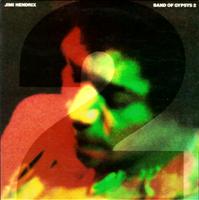
Band of Gypsys 2 is a posthumous live album by American rock musician Jimi Hendrix, released in October 1986 by Capitol Records. Produced by Alan Douglas, it followed the live mini LP Johnny B. Goode (1986), which also included live recordings from the Atlanta International Pop Festival (1970) and the Berkeley Community Theatre (1970).
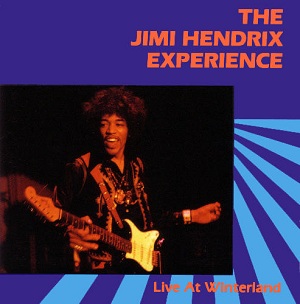
Live at Winterland is a live album by The Jimi Hendrix Experience. It compiles performances from the band's three concerts at the Winterland Ballroom in San Francisco, where they played two shows each night on October 10, 11 and 12, 1968. The album was released posthumously by Rykodisc in 1987 and was the first Hendrix release to be specifically conceived for the compact disc format.

The Baggy's Rehearsal Sessions is a posthumous compilation album by Jimi Hendrix, released on June 25, 2002 by Dagger Records. The album contains recordings from two rehearsal sessions for the Band of Gypsys' performances at the Fillmore East on December 31, 1969 and January 1, 1970.
"Ezy Ryder" is a song written and recorded by American musician Jimi Hendrix. It is one of the few studio recordings to include both Buddy Miles on drums and Billy Cox on bass, with whom Hendrix recorded the live Band of Gypsys album (1970).

"Hear My Train A Comin'" is a blues-based song written by Jimi Hendrix. Lyrically, it was inspired by earlier American spirituals and blues songs which use a train metaphor to represent salvation. Hendrix recorded the song in live, studio, and impromptu settings several times between 1967 and 1970, but never completed it to his satisfaction.

Machine Gun: The Fillmore East First Show is a live album by Jimi Hendrix, featuring songs recorded during the first set at the Fillmore East in New York City on December 31, 1969. Hendrix is backed by Billy Cox on bass and Buddy Miles on drums, a lineup frequently referred to as the Band of Gypsys. Except for "Hear My Train A Comin'" and "Lover Man", the eleven songs represent new material that had not been performed by the Jimi Hendrix Experience.
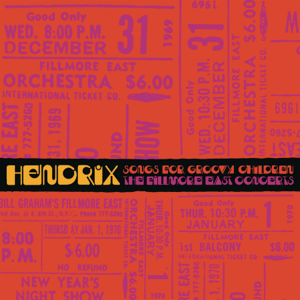
Songs For Groovy Children: The Fillmore East Concerts is a chronologically sequenced collection of American musician Jimi Hendrix's 1969–1970 New Years recorded performances at the Fillmore East in New York City. It was released as a box set of five-CDs on November 22, 2019 and an eight-LP set on December 13.

















